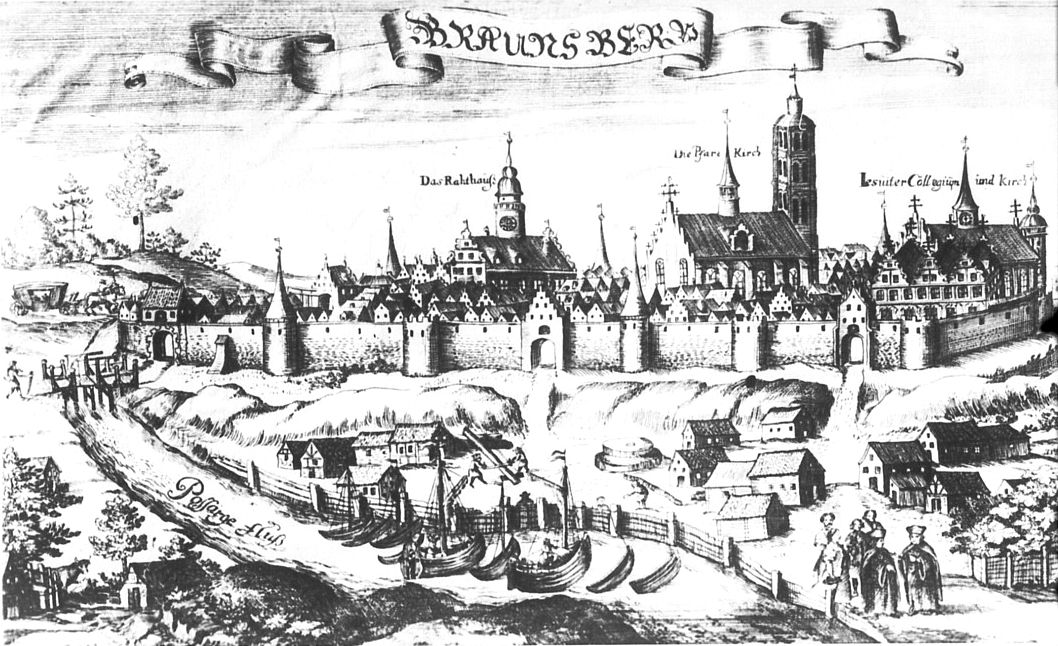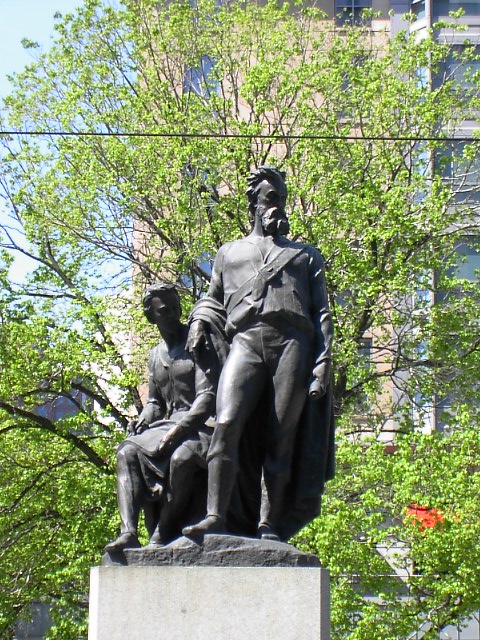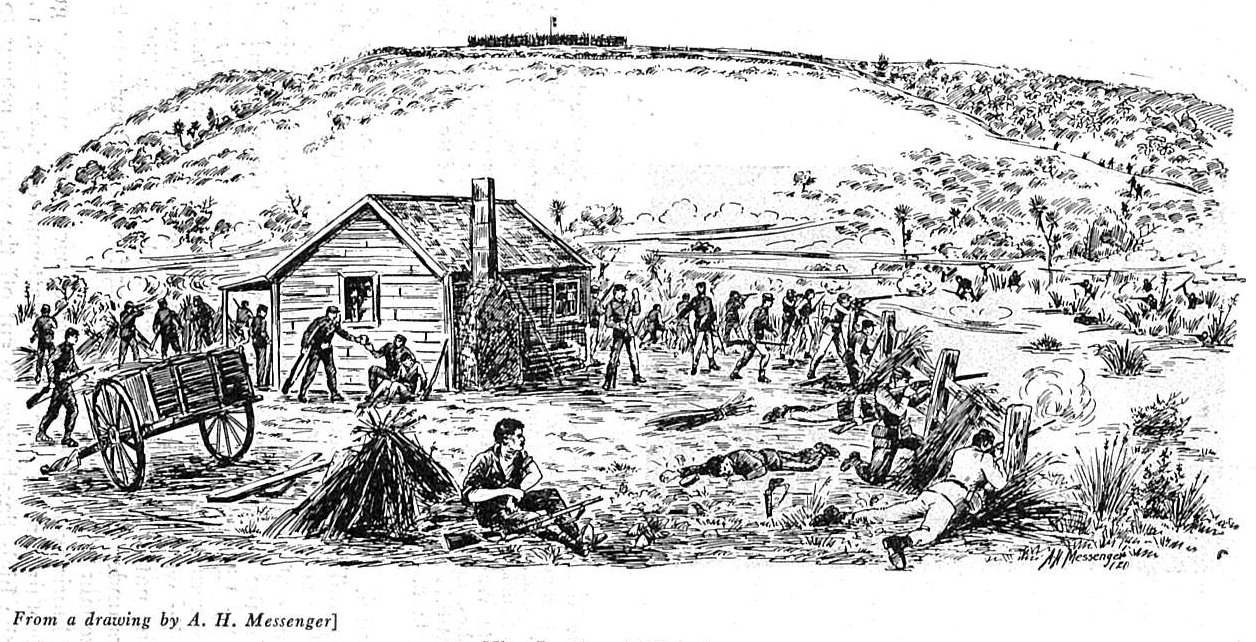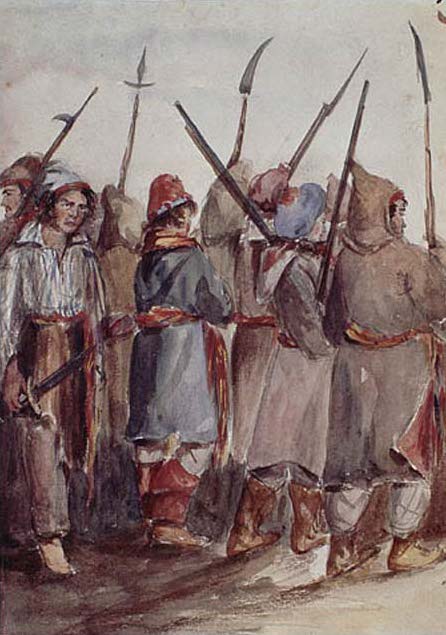|
Gustavus Von Tempsky
Gustavus Ferdinand von Tempsky (15 February 1828 – 7 September 1868) was a Prussian adventurer, artist, newspaper correspondent and soldier in New Zealand, Australia, California, Mexico and the Mosquito Coast of Central America. He was also an amateur watercolourist who painted the New Zealand bush and the military campaign. Early life Gustav Ferdinand von Tempsky was born in Braunsberg, East Prussia, into a Prussian noble family. The family had branches in Silesia and elsewhere and had a long military tradition. Von Tempsky was brought up in Liegnitz in Lower Silesia. After this time, he was sent to a junior cadet school in Potsdam and then a cadet school in Berlin. He was a cousin of the German writer Valeska von Gallwitz. In 1844, he was commissioned into his father's regiment in the Royal Prussian Army, possibly the Garde-Fusilier Regiment in which his brother, Benno Waldemar von Tempsky was a second lieutenant. In 1846, tiring of the routine, von Tempsky left the regi ... [...More Info...] [...Related Items...] OR: [Wikipedia] [Google] [Baidu] |
Braniewo
Braniewo () (german: Braunsberg in Ostpreußen, la, Brunsberga, Old Prussian: ''Brus'', lt, Prūsa), is a town in northern Poland, in Warmia, in the Warmian-Masurian Voivodeship, with a population of 16,907 as of June 2021. It is the capital of Braniewo County. Braniewo is the second biggest city of Warmia after Olsztyn and one of the historical centers of the region. Location Braniewo lies on the Pasłęka River about 5 km from the Vistula Lagoon, about 35 km northeast of Elbląg and southwest of Kaliningrad ( pl, Królewiec). The Polish border with Russia's Kaliningrad Oblast lies 6 km north, and may be reached from Braniewo via National road 54. History Middle Ages According to the German geographer Johann Friedrich Goldbeck (1748-1812), the town originally was named Brunsberg after Bruno von Schauenburg (1205–1281), bishop of Olomouc in Moravia, who accompanied King Ottokar II of Bohemia in 1254 and 1267 when the latter participated in the crusade of ... [...More Info...] [...Related Items...] OR: [Wikipedia] [Google] [Baidu] |
Robert O'Hara Burke
Robert O'Hara Burke (6 May 1821c. 28 June 1861) was an Irish soldier and police officer who achieved fame as an Australian explorer. He was the leader of the ill-fated Burke and Wills expedition, which was the first expedition to cross Australia from south to north, finding a route across the continent from the settled areas of Victoria to the Gulf of Carpentaria. The expedition party was well equipped, but Burke was not experienced in bushcraft. A Royal Commission report conducted upon the failure of the expedition was a censure of Burke's judgement. Early years Burke was born in St Clerens, County Galway, Ireland in May 1821. He was the second of three sons of James Hardiman Burke (1788 – January 1854), an officer in the British army 7th Royal Fusiliers, and Anne Louisa Burke ''née'' O'Hara (married 1817, d.1844). Robert O'Hara was one of seven children; * John Hardiman Burke (d. August 1863) * Robert O'Hara Burke (6 May 1821 – 28 June 1861) * James Thomas Burke (c. ... [...More Info...] [...Related Items...] OR: [Wikipedia] [Google] [Baidu] |
Hunua Ranges
The Hunua Ranges is a mountain range and regional park to the southeast of Auckland city, in the Auckland and Waikato regions of New Zealand's North Island. The ranges cover some and rise to 688 metres (2255 ft) at Kohukohunui.Hunua Ranges , ''An Encyclopaedia of New Zealand'', edited by A. H. McLintock, originally published in 1966. Te Ara - The Encyclopedia of New Zealand, updated 26 September 2006. Accessed 15 March 2007. owns and manages of the ranges, including part located in the Waikato region, as a regional park open to the public. Geography The ranges are located approximately 50 kilometres (30 mi) southeast of ...[...More Info...] [...Related Items...] OR: [Wikipedia] [Google] [Baidu] |
Māori People
The Māori (, ) are the indigenous Polynesian people of mainland New Zealand (). Māori originated with settlers from East Polynesia, who arrived in New Zealand in several waves of canoe voyages between roughly 1320 and 1350. Over several centuries in isolation, these settlers developed their own distinctive culture, whose language, mythology, crafts, and performing arts evolved independently from those of other eastern Polynesian cultures. Some early Māori moved to the Chatham Islands, where their descendants became New Zealand's other indigenous Polynesian ethnic group, the Moriori. Initial contact between Māori and Europeans, starting in the 18th century, ranged from beneficial trade to lethal violence; Māori actively adopted many technologies from the newcomers. With the signing of the Treaty of Waitangi in 1840, the two cultures coexisted for a generation. Rising tensions over disputed land sales led to conflict in the 1860s, and massive land confiscations, to which ... [...More Info...] [...Related Items...] OR: [Wikipedia] [Google] [Baidu] |
Volunteer Force (New Zealand)
The Volunteer Force was a voluntary part time military organisation of the New Zealand Military Forces. The force provided the bulk of New Zealand's defence during the late nineteenth century and was made up of small independent corps of less than 100 men. Throughout its entire existence, the Volunteer Force was criticised for being untrained, disorganised and poorly led, with units often prioritising dress uniforms over actual military training. Despite these misgivings, units of the Volunteer Force did conduct military actions during the New Zealand Wars and the Second Boer War. In 1910 the Volunteer Force was converted into the Territorial Force. Many of the modern day units of the New Zealand Army can draw their lineages back to corps of the Volunteer Force. The New Zealand Wars During the 1830s and 1840s, European settlers formed a number of volunteer units throughout the North Island and in Nelson in response to the fear of attack by local Maori. These units were not sanctio ... [...More Info...] [...Related Items...] OR: [Wikipedia] [Google] [Baidu] |
Irregular Military
Irregular military is any non-standard military component that is distinct from a country's national armed forces. Being defined by exclusion, there is significant variance in what comes under the term. It can refer to the type of military organization, or to the type of tactics used. An irregular military organization is one which is not part of the regular army organization. Without standard military unit organization, various more general names are often used; such organizations may be called a ''troop'', ''group'', ''unit'', ''column'', ''band'', or ''force''. Irregulars are soldiers or warriors that are members of these organizations, or are members of special military units that employ irregular military tactics. This also applies to irregular infantry and irregular cavalry units. Irregular warfare is warfare employing the tactics commonly used by irregular military organizations. This involves avoiding large-scale combat, and focusing on small, stealthy, hit-and-run ... [...More Info...] [...Related Items...] OR: [Wikipedia] [Google] [Baidu] |
British Subject
The term "British subject" has several different meanings depending on the time period. Before 1949, it referred to almost all subjects of the British Empire (including the United Kingdom, Dominions, and colonies, but excluding protectorates and protected states). Between 1949 and 1983, the term was synonymous with Commonwealth citizen. Currently, it refers to people possessing a class of British nationality largely granted under limited circumstances to those connected with Ireland or British India born before 1949. Individuals with this nationality are British nationals and Commonwealth citizens, but not British citizens. The status under the current definition does not automatically grant the holder right of abode in the United Kingdom but most British subjects do have this entitlement. About 32,400 British subjects hold active British passports with this status and enjoy consular protection when travelling abroad; fewer than 800 do not have right of abode in the UK. Nati ... [...More Info...] [...Related Items...] OR: [Wikipedia] [Google] [Baidu] |
Company Of Forest Rangers
A company, abbreviated as co., is a legal entity representing an association of people, whether natural, legal or a mixture of both, with a specific objective. Company members share a common purpose and unite to achieve specific, declared goals. Companies take various forms, such as: * voluntary associations, which may include nonprofit organizations * business entities, whose aim is generating profit * financial entities and banks * programs or educational institutions A company can be created as a legal person so that the company itself has limited liability as members perform or fail to discharge their duty according to the publicly declared incorporation, or published policy. When a company closes, it may need to be liquidated to avoid further legal obligations. Companies may associate and collectively register themselves as new companies; the resulting entities are often known as corporate groups. Meanings and definitions A company can be defined as an "artificial per ... [...More Info...] [...Related Items...] OR: [Wikipedia] [Google] [Baidu] |
William Jackson (New Zealand Politician)
William Jackson (11 October 1832 – 29 September 1889), generally known as Major Jackson, was a 19th-century Member of Parliament in the Waikato region of New Zealand. Early life Jackson was born in 1832 in Providence Green, Green Hammerton, near Harrogate, Yorkshire, England. He was the son of Samuel Jackson (1806–1858), a brewer and yeoman who owned and farmed his land, and Sarah Jackson (née Hughlings; 1807/08–1836), the daughter of a Welsh revenue collector. His mother died when he was four. He had three brothers and a sister; all but one of the brothers emigrated to New Zealand. His parents had married on 24 March 1828. His oldest sibling was his sister Ann (30 April 1829 – 9 August 1859). She died three days after giving birth to her first child. His eldest brother was Samuel, who studied law, was called to the bar in 1853, and emigrated to Auckland in 1856, where he became a prominent lawyer. William himself was the third of the children; he was born on 11 Octob ... [...More Info...] [...Related Items...] OR: [Wikipedia] [Google] [Baidu] |
The Daily Southern Cross
''The New Zealand Herald'' is a daily newspaper published in Auckland, New Zealand, owned by New Zealand Media and Entertainment, and considered a newspaper of record for New Zealand. It has the largest newspaper circulation of all newspapers in New Zealand, peaking at over 200,000 copies in 2006, although circulation of the daily ''Herald'' had declined to 100,073 copies on average by September 2019. Its main circulation area is the Auckland region. It is also delivered to much of the upper North Island including Northland, Waikato and King Country. History ''The New Zealand Herald'' was founded by William Chisholm Wilson, and first published on 13 November 1863. Wilson had been a partner with John Williamson in the ''New Zealander'', but left to start a rival daily newspaper as he saw a business opportunity with Auckland's rapidly growing population. He had also split with Williamson because Wilson supported the war against the Māori (which the ''Herald'' termed "the ... [...More Info...] [...Related Items...] OR: [Wikipedia] [Google] [Baidu] |
Auckland
Auckland (pronounced ) ( mi, Tāmaki Makaurau) is a large metropolitan city in the North Island of New Zealand. The List of New Zealand urban areas by population, most populous urban area in the country and the List of cities in Oceania by population, fifth largest city in Oceania, Auckland has an urban population of about It is located in the greater Auckland Region—the area governed by Auckland Council—which includes outlying rural areas and the islands of the Hauraki Gulf, and which has a total population of . While European New Zealanders, Europeans continue to make up the plurality of Auckland's population, the city became multicultural and Cosmopolitanism, cosmopolitan in the late-20th century, with Asian New Zealanders, Asians accounting for 31% of the city's population in 2018. Auckland has the fourth largest Foreign born, foreign-born population in the world, with 39% of its residents born overseas. With its large population of Pasifika New Zealanders, the city is ... [...More Info...] [...Related Items...] OR: [Wikipedia] [Google] [Baidu] |





_p225_AUCKLAND%2C_NEW_ZEALAND.jpg)